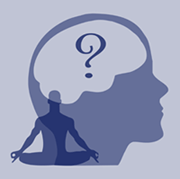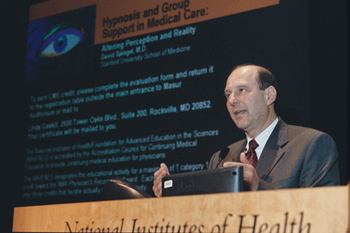Back to: News
|
Back to: News |
 |
Life Stresses and
|
||||||||||||||||||||
 |
Stress: We all live with it, whether we are aware of it or not. It can be produced by interactions with our families or jobs; knowledge of current events, such as threats of a terrorist attack or a plunge in the stock market; or living with a disease or medical condition, either in ourselves or in a loved one.
What is stress? Generally speaking, stress is caused by events in the environment that pose a threat to our safety and well-being. The mind interprets what is happening, and the body responds. The pioneering research into the effects of stress was done by Dr. Hans Selye in the 1930s, who defined stress as the body's nonspecific response to any demands made upon it. Stress can be negative (such as an illness or an argument) or positive (such as accepting a new job or falling in love). In either case, the body's response, including the release of hormones and chemicals, is the same, in the sense of disrupting homeostasis (i.e., stability in the normal body--for example, stability of internal temperature).
Sometimes stress can be useful. When stress is mild or lasts for a short time, it can help spur us on--for example, to avoid a dangerous situation, meet a deadline at work, or compete in an athletic event. But when stress is intense or lasts a long time (i.e., when the body and mind stay on "red alert" for weeks, months, or even years), physical and mental health problems can result--including headaches, stomach problems, insomnia, depression, problems concentrating, physical pain, chest pain, and heart disease. Stress is expensive. The costs of health care for U.S. workers with high levels of job stress are nearly 50 percent higher than those for other workers. In short, stress is a significant public health problem.
Accordingly, NCCAM is sponsoring studies on techniques from complementary and alternative medicine (CAM)1 to prevent, manage, and treat stress-related problems. One CAM area being used for stress is that of mind-body interventions--that is, techniques designed to enhance the mind's capacity to affect bodily function and symptoms.
"Our goal at NCCAM is to pursue the best science that we can," says NCCAM Director Stephen E. Straus, M.D. "We have an opportunity to harness wonderful new tools that are now available--from interventions and imaging, to discoveries in basic neurobiology--to ask and answer questions about mind-body modalities in the CAM domain."
NCCAM-funded studies include:
For other examples of NCCAM research on mind-body interventions, visit NCCAM's Clinical Trials By Treatment or Therapy page or contact the NCCAM Clearinghouse.
Margaret A. Chesney, Ph.D., Deputy Director of NCCAM, has researched stress and illness for the past 25 years. She notes, "We know that the mind and body are in active dialogue with one another. Our job is to learn all we can about the language they are speaking, and to identify ways to harness it--through CAM interventions--for better health."
Other NCCAM Activities on Mind-Body InterventionsMind-Body Research Initiative: In January 2003, NCCAM joined 15 other NIH entities in releasing a mind-body research initiative. "Mind-Body Interactions and Health: Research Infrastructure Program" will allow scientists and institutions already conducting high-caliber mind-body research to pursue new opportunities. A companion program, "Mind-Body Interactions and Health: Exploratory/Developmental Research Program," is targeted to institutions at earlier research stages.Intramural Research: The NCCAM Division of Intramural Research, located on the NIH campus, plans to conduct research on selected CAM modalities that might relieve or ease the life stressors of depression, cognitive decline, chronic pain, frailty, and sleep disorders, particularly as they affect the elderly and the medically underserved. Studies will look particularly at the endocrine, nervous, and immune systems. |
1. CAM is a group of diverse medical and health care systems, practices, and products that are not presently considered to be part of conventional medicine. While some scientific evidence exists regarding some CAM therapies, for most there are key questions that are yet to be answered through well-designed scientific studies--such as whether they are safe and whether they work for the diseases or medical conditions for which they are used. For more about CAM and conventional medicine, see the NCCAM fact sheet "What Is Complementary and Alternative Medicine?"
2. Placebos and the response they produce can be useful in clinical trials (research studies in people) and health care. In clinical trials, a placebo is designed to resemble the treatment being studied, except that the placebo is inactive (an example is a sugar pill). By giving one group of participants a placebo and the other group the active treatment, researchers can compare how the two groups respond. In recent years, the definition of placebo has been expanded to include other things that can have an impact on the results of health care, such as how a patient and a health care provider interact, how a patient feels about receiving the care, and what he or she expects to happen from the care.
3. In Mindfulness-Based Stress Reduction, participants learn specific skills for paying attention, relaxing deeply, and enhancing awareness; these skills can be applied to reduce stress. Qi gong ("chee-GUNG") is a component of traditional Chinese medicine. It combines movement, meditation, and regulation of breathing, with the goal of enhancing the flow of qi (an ancient term given to what is believed to be vital energy).
Sources for this article include consumer information from the National Institute for Occupational Safety and Health; the National Ag Safety Database at the Centers for Disease Control and Prevention; and the following journal article: Glaser R, Rabin B, Chesney M, et al. Stress-induced immunomodulation: implications for infectious diseases? Journal of the American Medical Association. 1999; 281(24):2268-2270.
Visit nccam.nih.gov/research/announcements for more information on these and other NCCAM funding opportunities.
NCCAM is expanding its team of Program Officers to manage research portfolios in pharmacology/pharmacognosy, immunology/allergy, infectious diseases, oncology, musculoskeletal disorders, and psychology. Positions are in Bethesda, Maryland.
For more information, go to nccam.nih.gov/about/jobs/programofficer.
 |
David Spiegel, M.D., professor of psychiatry and behavioral sciences at Stanford University School of Medicine, spoke at NIH on May 6, 2003, as part of the NCCAM series "Distinguished Lectures in the Science of Complementary and Alternative Medicine." Dr. Spiegel's lecture, "Hypnosis and Group Support in Medical Care: Altering Perception and Reality," can be viewed on the Web at videocast.nih.gov/pastevents.asp (select "Special Lectures/Press Conferences" and scroll back to the lecture date). |
| The next meeting of the National Advisory Council for Complementary and Alternative Medicine will be held on September 8, 2003, at the NIH Neuroscience Building, 6001 Executive Boulevard, Rockville, Maryland. For more information, go to nccam.nih.gov/about. |
Since April 2003, the U.S. Food and Drug Administration (FDA) has issued warnings to consumers not to purchase or consume various dietary supplements promoted for increasing desire, confidence, and sexual performance. At press time, these products included Vinarol, Viga, Sigra, Stamina Rx, Stamina Rx for Women, Y-Y, Spontane ES, and Uroprin. The FDA found that each contained an unlabeled prescription ingredient that could pose serious health risks for users who also take prescription drugs containing nitrates (such as nitroglycerin). The unlabeled ingredients are sildenafil (also found in Viagra) or tadalafil (also found in a drug sold in Europe, Cialis). Consumers of the supplements named above should stop using them immediately and consult their health care provider about any medical concerns. For updated alerts and advisories, go to nccam.nih.gov/health.
The Director of the National Institutes of Health (NIH) invites applications from interested persons for the NIH Director's Council of Public Representatives (COPR). The Council consists of up to 21 persons who are selected from among the diverse communities that benefit from, and have an interest in, NIH research, programs, and activities. It advises NIH on cross-cutting issues related to medical research and health issues of public interest. For more information or to obtain an application (due September 15, 2003), go to copr.nih.gov/application_process.shtm or call 301-650-8660.
NCCAM has launched an electronic news bulletin, the NCCAM Update. The Update, sent by e-mail approximately once per month, informs readers about NCCAM activities and announcements. There is no charge for the service. To find out more or to subscribe, go to nccam.nih.gov/news.
NCCAM has also posted Spanish-language versions of "Are You Considering Using Complementary and Alternative Medicine?" and "What Is Complementary and Alternative Medicine?"
Summer 2003
Volume X
Number 3
What's Inside... |
|
Printer-friendly version (PDF) |
|
Note: The PDF file requires a viewer such as Adobe Reader, which you can download free of charge from the Adobe Web site.
|
|||||||||||